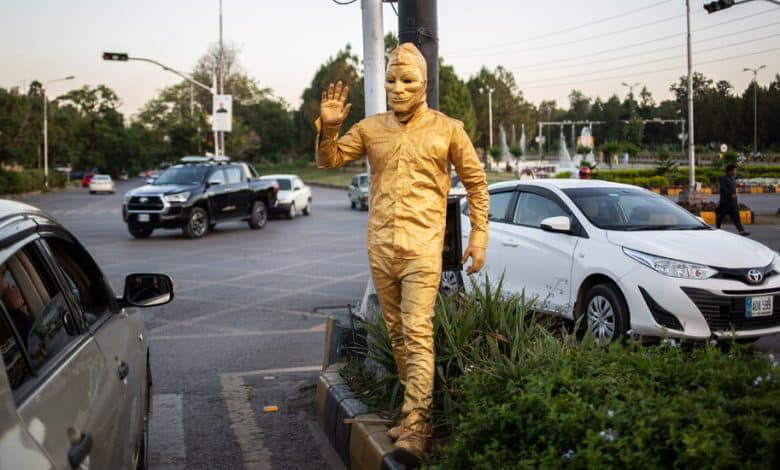Are Those Mimes Spying on Us? In Pakistan, It’s Not a Strange Question.

The street performers first appeared a few years ago along busy intersections of Islamabad. Coated head to toe in eye-catching gold paint, they stood perfectly still, leaning on glimmering canes and tipping their top hats open. Some cracked a smile or offered a slow nod when they earned tips from passers-by.
Perhaps in a different place, the emergence of mimes on the street looking to earn a few dollars might go unnoticed. But this is Pakistan, where things under the security state often are not as simple as they seem. So as the number of golden performers grew, so, too, did the intrigue around them. Could they be informants for the country’s intelligence agency? Lookouts for powerful politicians? Maybe spies for the C.I.A.?
“In any other country, if you see a beggar, it’s clear he’s a beggar,” said Habib Kareem, 26, a lawyer in Islamabad, the capital. “But here, you see a beggar and you think to yourself, ‘He’s working for them,’” he added, referring to Pakistan’s powerful intelligence services.
Today, the “golden men” of Islamabad have been added to the ranks of the conspiracy theories sprouted, knocked down and rehashed every day across the city. In Pakistan, where the hand of the security services is seen everywhere, conspiracy theories have been embraced in the mainstream for decades, driving conversations among street vendors, politicians and everyone in between.
Suspicion has become so universal that wild tales take root after almost every news event. In the wake of catastrophic floods in 2010, people asserted that they had been caused by C.I.A. weather-controlling technology. Media pundits claimed that an American “think tank” was behind a failed car bombing by a Pakistani American in Times Square that year, and that Osama bin Laden was actually Jewish.
Others were convinced that the C.I.A. staged the assassination attempt on Malala Yousafzai, the girls’ education activist, in 2012 after a local newspaper ran a satirical “investigation” describing the plot with outlandish details. (A disclaimer was later added to the article, which was meant to poke fun at the country’s love of conspiracy theories, to clarify that it was fiction.)




